
LET FREEDOM RING:
ART & DEMOCRACY IN THE KING YEARS, 1954-1968
APRIL 17, 2008
The last day's first panel was titled "Living History," one of the more apt appellations. Six SNCC activists recalled the triumphs and terrors of Mississippi Freedom Summer. Lawrence Guyot built a wall of books around his microphone and appeared determined to refer to each and every one of them before he was good naturedly interrupted by the moderator, Professor Maurice Jackson. Guyot had announced that the audience needn't worry; he would stop when he was finished. Michael Thelwell marvelled at the fact that he had now lived long enough to see Lawrence Guyot interrupted. In fact, though, we all wished he could have gone on for hours -- Guyot worked alongside Fannie Lou Hamer and was a major force in organizing the Mississippi freedom Democratic Party. Everyone on that panel had that kind of story to tell: Charlie Cobb, Walter Fauntroy, Dorie Ladner, Ivanhoe Donaldson and Rutha Harris. Having been away from my home town for a while, I was struck by how little Walter Fauntroy has changed over the years. The highpoint came at the close, when Rutha Harris rose from her seat and got the entire audience to their feet with her. Harris was one of the original Freedom Singers. (Berneice Johnson Reagon was another -- That famous photograph of everybody on stage at the Newport festival holding hands and singing "We Shall Overcome" centers on them.) The recording you can hear by clicking at the top of this post features a song written by the activists themselves after one of their number had been assassinated.
ART & DEMOCRACY IN THE KING YEARS, 1954-1968
APRIL 17, 2008
The last day's first panel was titled "Living History," one of the more apt appellations. Six SNCC activists recalled the triumphs and terrors of Mississippi Freedom Summer. Lawrence Guyot built a wall of books around his microphone and appeared determined to refer to each and every one of them before he was good naturedly interrupted by the moderator, Professor Maurice Jackson. Guyot had announced that the audience needn't worry; he would stop when he was finished. Michael Thelwell marvelled at the fact that he had now lived long enough to see Lawrence Guyot interrupted. In fact, though, we all wished he could have gone on for hours -- Guyot worked alongside Fannie Lou Hamer and was a major force in organizing the Mississippi freedom Democratic Party. Everyone on that panel had that kind of story to tell: Charlie Cobb, Walter Fauntroy, Dorie Ladner, Ivanhoe Donaldson and Rutha Harris. Having been away from my home town for a while, I was struck by how little Walter Fauntroy has changed over the years. The highpoint came at the close, when Rutha Harris rose from her seat and got the entire audience to their feet with her. Harris was one of the original Freedom Singers. (Berneice Johnson Reagon was another -- That famous photograph of everybody on stage at the Newport festival holding hands and singing "We Shall Overcome" centers on them.) The recording you can hear by clicking at the top of this post features a song written by the activists themselves after one of their number had been assassinated.



 Rutha Harris was also the featured speaker at the lunch session. Her lecture took the form of a guided tour through the movement's music. Harris is still in remarkably powerful voice. You can order her recent recording I AM ON THE BATTLEFIELD from Amazon. She has also recently recorded with Mavis Staples.
Rutha Harris was also the featured speaker at the lunch session. Her lecture took the form of a guided tour through the movement's music. Harris is still in remarkably powerful voice. You can order her recent recording I AM ON THE BATTLEFIELD from Amazon. She has also recently recorded with Mavis Staples.


The afternoon session was another symposium of artists: Askia Toure, Jayne Cortez, Randall Keenan, Thulani Davis and Eugene Redmond, moderated by Robert Patterson (another impressive young graduate of Georgetown's PhD program.) That was followed by Michael Eric Dyson's keynote address, "'A Change Is Gonna Come?' Art and the Politics of the Black Possible." As always, Dyson spoke rapidly, in complete paragraphs with footnotes, but with no text in front of him. Michael talks faster than I can think, but my brain usually catches up to him before too long and he is always invigorating. I checked the podium afterwards to confirm my suspicion that his talks go directly into a device that turns them into books, but no such device was in evidence. Years ago Michael came up to me after an MLA talk and told me effusively that I had been representin'. Few represent as effectively as Michael. Now that he's at Georgetown, maybe he should be the District's next non-voting congressional delegate. I suspect he might shake things up on the Hill more than the first delegate, Walter Fauntroy, was able to do. (FYI For those of you in states with voting representation, the current D.C. non-voting congressional delegate is Eleanor Holmes Norton, one of the very few guests on The Colbert Report who has been able to hold her own with the host.)





Dyson's energetic presentation was a good lead-in to the evening's final set of readings. Prose and Poetry from Jayne Cortez, Randall Keenan, Thulani Davis . . . with a sort of performance/meditation/group hug from actress and arts activist Barbara Ann Teer.
It was the end of a very long day, but none of us was weary. We've made up our minds, and we won't turn around.





































No comments:
Post a Comment